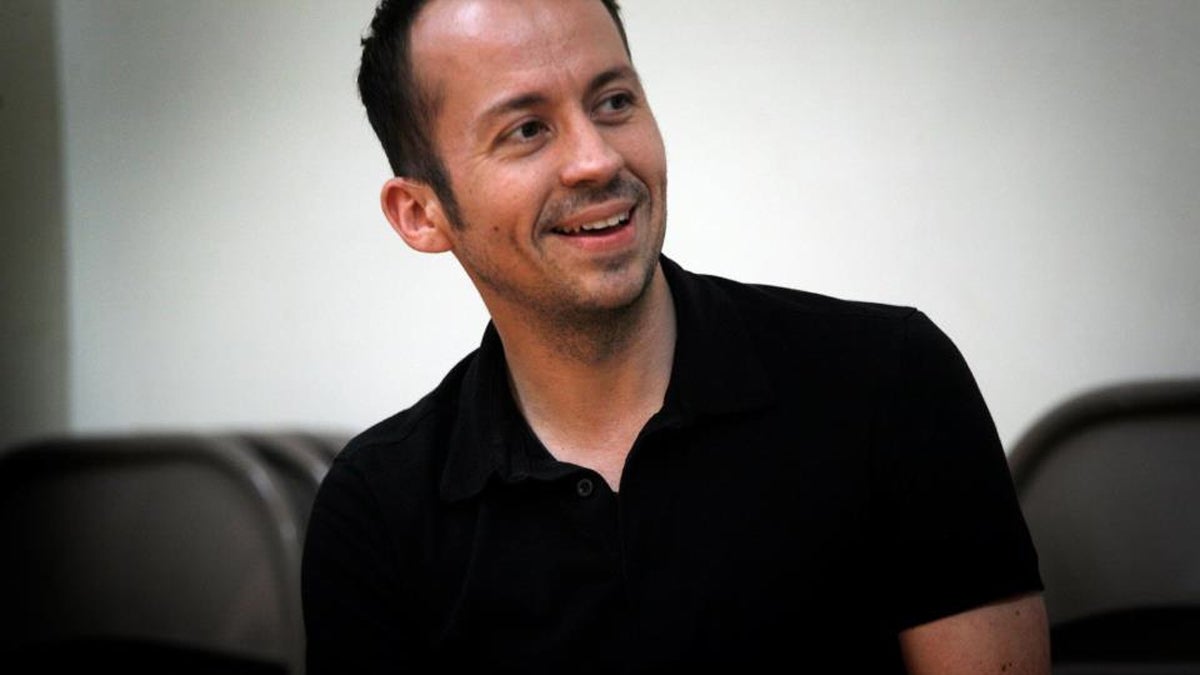When Dad says, ‘Oops, don’t watch that video,’ what can you do but watch?
Listen
Storyteller David Crabb
If you don’t want your 11-year-old son to watch that video you accidentally left in the camcorder you just returned to him, do not — repeat: do not — tell him not to watch it. Decades ago, New York storyteller David Crabb was that 11-year-old boy.
As he says in this story, performed live at the 2014 First Person Arts Festival’s Story League Sings event, even at his age, he knew that “there are certain things you can’t undo psychologically. There are things in this world that cannot be unseen.” Riven with curiosity, David must decide whether or not to press “play.”
He pressed “play.”
What he saw was something David could never have predicted. Listen to his story above. And read a brief Q&A with David here.
[Audio produced by Kimberly Haas.]
—
Why do you think your dad was so supportive of your interests?
Well, to be honest, I wasn’t very good at “boy stuff.” I never excelled at baseball or soccer. Horse riding was one of the only semi-athletic things I was good at, until I developed an allergy to hay when I was 11 and could no longer be anywhere near the stables. Around the same time I started having nose bleeds from the chlorine in swimming pools. Let’s just say I was a “delicate flower” and got really good at being an “indoor kid.”
Drawing, band, and theatre arts were all things I enjoyed and didn’t need an EpiPen to participate in. So, as supportive and genuinely interested in my happiness as my parents were, they didn’t really have much choice. That being said, thanks for all the art supplies and saxophone, dad!
You mention a number of ’80 TV shows in your story, e.g., “Charles in Charge,” “Kate & Ally,” “Kung Fu.” What were your favorite ’80s TV shows, and why?
As much as I loved “The Facts of Life,” I think my favorite might have to be “Too Close For Comfort.” It was a show about a middle-aged cartoonist with two very different daughters who would not move out of his house. He often spoke through a sock puppet cow character. It was a weird show to say the least, made even more bizarre by the inclusion of Jim J. Bullock, a zany and rather effeminate friend of the girls.
I wasn’t old enough to understand that I was seeing a very gay man on prime time network television, but I knew there was an “otherness” about him that I really enjoyed. Looking back on him now is like watching old George Michael videos or the actor Dick Sargent on “Bewitched.” Like, really? No one raised the pink flag on these guys? I just love that people like Jim were so hilarious that the public appreciated them too much to care about their private lives, which is as it should be.
When and how was it revealed to your dad that you actually did watch the video? (Or did he just always assume that you had seen it?)
I had started telling the story casually to friends years ago. When I started telling it live, I figured it was time to tell my dad about having seen the video. I remember we were shopping for clothes at Walmart when I brought it up. He was holding a button-down shirt against his chest to see how it looked when I asked him about the video. He looked at me quizzically and I freaked out. It suddenly struck me that I was petrified. This seemed like a very high-stakes thing to reveal to him. So very tentatively I said, “You know … the video where you sing that country song in your hotel room alone?” There was a pause before he shrugged and said, “Hmmm. Sounds like somethin’ I woulda done.” It was pretty anticlimactic, but also kind of adorable.
—
David Crabb is a performer, writer, teacher and storyteller in New York City. He is a Moth story slam host and three-time Moth slam winner. His solo show, “Bad Kid” (running for the next two months at Axis Theatre in NYC), was met with critical acclaim and named a New York Times critic pick. A memoir based on the show was released this year by Harper Perennial.
First Person Arts is Philadelphia’s premiere storytelling organization and the presenters of twice-monthly StorySlams, the weekly First Person Arts Podcast, and the annual First Person Arts Festival. Founded in 2000, FPA believes that everyone has a story to tell, and that sharing our stories connects us with each other and the world. From such artistic luminaries as novelist Toni Morrison, activist Angela Davis, and celebrity chef Marcus Samuelsson, to emerging artists and everyday people, FPA presents a diverse array of storytellers to transform the drama of real life into memoir and documentary art.
WHYY is your source for fact-based, in-depth journalism and information. As a nonprofit organization, we rely on financial support from readers like you. Please give today.

